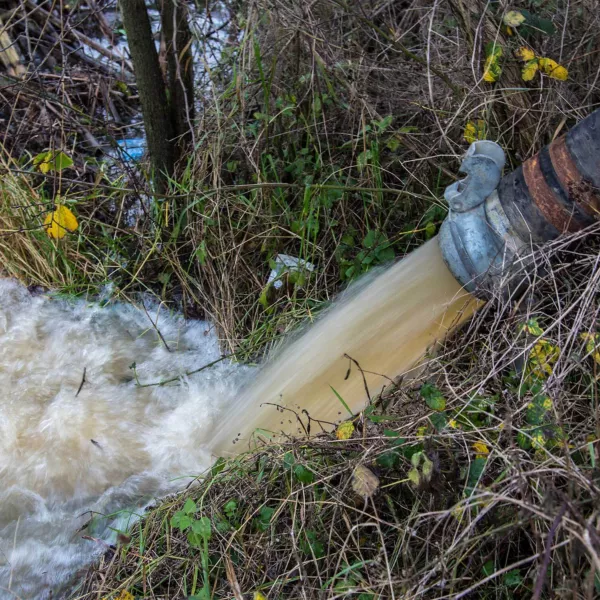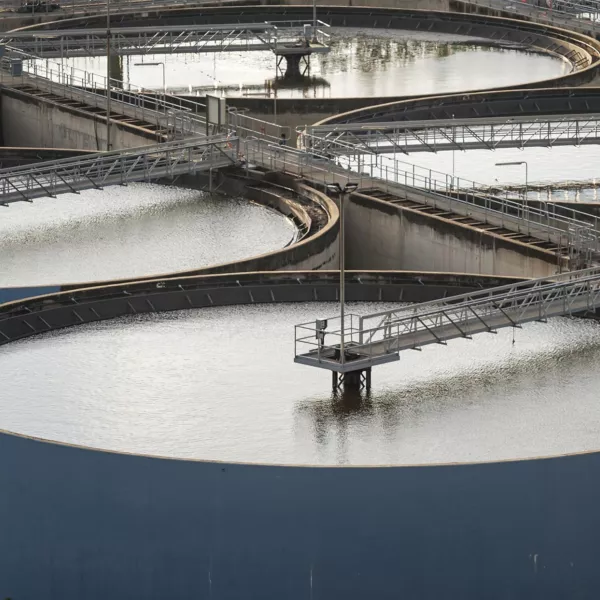Removing PFAS from water at a waste management site
Across the world, legislation to control poly- and perfluoroalkyl substances (PFAS) is in development, if not already in place. This French waste management services company is future-proofing its business by trialling DESOTEC’s filters to ensure that its operations will be compliant with any future PFAS control framework.
Key takeaways
- PFAS regulations are inevitable in the coming years, so far-sighted businesses should take a proactive approach.
- Activated carbon filtration is proven to be the Best Available Treatment (BAT) for PFAS, and is also the most commercially viable.
- DESOTEC’s solutions not only remove PFAS from customers’ sites, but also destroy the molecules completely.
- Clients know they can trust DESOTEC’s solutions for even the smallest PFAS molecules, thanks to our extensive experience and the lab tests and trials that we can offer.
The background
This large firm operates waste management services at multiple sites in France, across Europe, and further afield. Its services include incineration, recycling, landfill, biogas/ biomethane production and more.
The company is committed to protecting the environment. Furthermore, it is highly aware that legislation around PFAS is coming at some point soon: the French authorities have already asked companies to start taking measurements and drawing up action plans to feed into the development of a PFAS control framework.
Therefore, the client wants to future-proof its business and position itself to take advantage of the inevitable explosion in demand for PFAS waste management services. It launched a large-scale project to trial PFAS treatment technology at many of its sites.
DESOTEC bid for the tender, drawing on our extensive expertise to propose effective solutions tailored for the relevant process parameters at each site. We were awarded the lion’s share, and installed multiple larger and smaller filters at 15 sites in February and March 2024.
To illustrate this major project, we will look here in more depth at just one of these locations, which is typical of much of our work for this client.


The challenge
This site handles liquid and solid waste and sludge that may be hazardous or non-hazardous. Wastewater from clients or the company’s own operations is sent to its treatment plant (WWTP).
While the treated water is safe for discharge under current legislation, tests showed chemical oxygen demand (COD) levels at 570mg/l, and PFAS at 732 µg/l. This PFAS level is likely to exceed any future limit for water for discharge.
The client therefore asked DESOTEC for help in lowering PFAS, using the current drinking water limit of 100 ng/l per individual PFAS molecule as its benchmark.
The solution
DESOTEC installed two MOBICON filters in series to treat the flow rate of 60 m³/ hour.
The first is filled with a carbon grade suitable for removing the bulk of organic compounds in the wastewater – namely, the COD and the larger PFAS molecules.
The second is filled with a higher grade carbon, from our B-PURE® range, designed especially for adsorbing even the smallest PFAS molecules such as perfluorobutanoate (PFBA), perfluorobutanesulfonic acid (PFBS) and trifluoroacetate (TFA).
This two-filter model preserves the more costly higher grade carbon to treat the PFAS, as a polishing step. This boosts sustainability and cost-effectiveness.
While DESOTEC’s set-ups for this client are tailored to the purification requirements and process parameters of each particular site, many follow this two-filter model.
The results
The treated water is tested regularly by an external lab, and the results discussed every week with the client and DESOTEC. Tests have shown that the treatment is consistently bringing PFAS levels down to below the drinking water limit.
The environmental authorities have also tested the water a few times as part of a data collection exercise that will feed into the eventual PFAS treatment framework for France. Their measurements tally with those carried out for the client.
So far, neither filter has required exchange. When they do, it will be a simple and quick operation with minimal downtime.
Waste handling is included in DESOTEC’s service, so the saturated filters will be transported to our facilities, where the carbon is emptied and tested.
DESOTEC has developed a reliable method to measure PFAS levels on spent carbon. This allows to make an informed decision about the best PFAS waste treatment option. If the PFAS concentration is below the POPs Regulation limit (1mg/kg PFOA, 1mg/kg PFHxS and 50mg/kg PFOS), we can treat the carbon at our facilities safely and sustainably, making sure PFAS is eliminated below detectable levels.
Therefore, DESOTEC does not merely move PFAS molecules from one place to another – we solve the problem completely.
Depending on the concentration levels and types of molecule adsorbed, the carbon is then likely to be reactivated for reuse.
The client can now reassure potential and existing customers that it has a complete and reliable solution for PFAS waste ready to go as soon as the new framework is announced, protecting the environment from PFAS for generations to come.
Contact DESOTEC
If you’d like to discuss or trial DESOTEC solutions for your PFAS purification needs, contact our experts today.
Contact our expertsContact DESOTEC
If you’d like to discuss or trial DESOTEC solutions for your PFAS purification needs, contact our experts today.
Contact our experts-
PFAS
Finding PFAS in the environment is a huge concern globally. For industry, it’s a challenge that companies must now tackle head-on. DESOTEC provides reliable, flexible solutions to eliminate PFAS pollution permanently and sustainably. -
Waste and Wastewater Management
Sustainable air and water purification for waste management and recycling to protect our environment and control odors. -
Our unique service
Our closed-loop, full-service model is as unique as your business needs. We’ll define the right filtration setup and safely recycle filtration waste, making it easy to go green.


